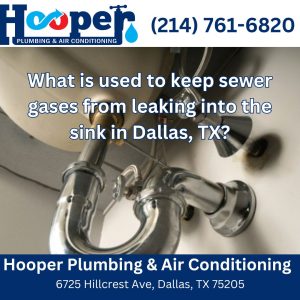The primary plumbing solution to prevent sewer gases from leaking into the sink is the P-trap—a U-shaped pipe beneath the sink designed to hold water and block unpleasant odors from entering the home.

Understanding the Role of a P-Trap in Plumbing
Plumbing plays a crucial role in maintaining sanitation and comfort in every home. The P-trap is essential to the drainage system, ensuring that sewer gases remain trapped below the sink instead of seeping into your home. Located under every sink, this curved pipe section always holds a small amount of water. This water barrier effectively blocks harmful gases from escaping the drainage system. In Dallas, Texas, where residential and commercial properties rely on efficient plumbing systems, understanding the function of a P-trap is key to preventing unpleasant odors and maintaining air quality indoors.
How Sewer Gases Can Enter Your Home
While P-traps are designed to prevent sewer gas leaks, certain conditions can compromise their effectiveness. Here are some common reasons why sewer gases might escape into your sink:
- Dry P-Traps—If a sink is left unused for an extended period, the water in the P-trap can evaporate, eliminating the protective barrier and allowing sewer gases to pass through.
- Clogged or Blocked Vents – Plumbing systems include vent pipes that direct gases away from living spaces. If these vents become blocked due to debris, bird nests, or other obstructions, it can create negative pressure, drawing sewer gases into your home.
- Leaky or Damaged P-Traps – A cracked or improperly installed P-trap may allow gas to bypass the water seal, leading to odor issues.
- Improperly Installed Plumbing – Incorrect drainage pipes or venting system installation can create sewer gas leaks.
- Blocked Drains—When sink drains are clogged, trapped wastewater can produce foul smells, which are sometimes mistaken for sewer gases.
Signs of Sewer Gas Leaks in Your Home
Detecting sewer gas leaks early is crucial for maintaining a healthy home environment. Here are common indicators that your plumbing system might be allowing sewer gases to leak into your sink:
- A persistent rotten egg or sulfur-like smell near the sink
- Gurgling sounds from the drain when using other fixtures.
- Slow drainage or water bubbling in the sink
- Increased humidity or condensation around pipes
- Frequent headaches or nausea, which can be caused by exposure to sewer gases
If you experience any of these issues, investigating your plumbing system is essential to determine the root cause.
Preventing Sewer Gas Leaks in Your Sink
Fortunately, there are several steps you can take to prevent sewer gases from leaking into your sink and affecting your indoor air quality. These measures ensure your plumbing system functions efficiently and remains free of unpleasant odors.
1. Regularly Use All Sinks
To prevent P-traps from drying out, run water through unused sinks at least once weekly. Pouring a cup of water down the drain replenishes the water barrier, effectively keeping gases from escaping.
2. Check and Maintain P-Traps
Inspect P-traps periodically for cracks, leaks, or improper connections. If you notice any damage, replacing the P-trap is necessary to maintain its functionality.
3. Ensure Proper Ventilation
Vents play a crucial role in plumbing systems, allowing gases to escape safely outside rather than into your home. If you suspect a blocked vent, check for obstructions like debris, bird nests, or snow buildup on roof vents.
4. Keep Drains Clear
Clogged drains can contribute to foul odors. Regularly cleaning drains with hot water, baking soda, and vinegar helps break down minor blockages and prevents organic matter buildup.
5. Use Drain Covers
Installing drain covers prevents debris, hair, and food particles from accumulating in pipes, reducing the risk of clogs that can contribute to odor issues.
6. Check Plumbing Seals
Pipe seals and connections can deteriorate over time, allowing gases to escape. To maintain a properly functioning drainage system, inspect these components periodically and replace any worn-out seals.
The Importance of Professional Plumbing Inspections
While homeowners can perform essential maintenance, plumbing inspections by a professional ensure potential issues are identified early. In Dallas, Texas, professional plumbers have the expertise to diagnose and resolve plumbing concerns efficiently, preventing more significant problems down the line.
Common Plumbing Issues That Can Lead to Sewer Gas Leaks
Beyond P-traps, other plumbing problems can contribute to sewer gas leaks. Understanding these issues can help homeowners maintain their plumbing systems effectively.
1. Broken or Blocked Vent Pipes
Vent pipes allow sewer gases to escape safely. If these pipes are cracked or obstructed, gases may find alternative routes into the home.
2. Sewer Line Issues
Cracks or leaks in the sewer line can lead to gas buildup, which can travel through drain pipes into the house. Professional plumbers can inspect sewer line damage and recommend solutions.
3. Poorly Installed or Damaged Drain Seals
Floor drains, shower drains, and toilet seals must be installed correctly to prevent gas leaks. Over time, these seals may degrade, allowing odors to escape.
When to Call a Professional Plumber
If sewer gas leaks persist despite troubleshooting, contact a professional plumber. A skilled plumber can inspect the entire drainage system, identify leaks, and provide necessary repairs to ensure a safe and odor-free home.
In Dallas, Texas, plumbing professionals have the latest tools and knowledge to address sewer gas issues effectively. Whether diagnosing venting problems, replacing worn-out P-traps, or clearing stubborn clogs, their expertise ensures long-term solutions.
Final Thoughts on Preventing Sewer Gas Leaks
Sewer gas leaks can be both unpleasant and hazardous to health. Fortunately, proper plumbing maintenance and awareness of potential issues can help homeowners keep their indoor air quality fresh and clean. Regularly using sinks, checking P-traps, ensuring adequate ventilation, and maintaining drain cleanliness are simple yet effective ways to prevent sewer gas intrusion.
Maintaining a well-functioning plumbing system in Dallas, Texas, is essential for ensuring comfort and safety. If persistent sewer gas smells arise despite taking preventive measures, seeking professional plumbing assistance is the best way to resolve the issue and protect your home from further complications.


